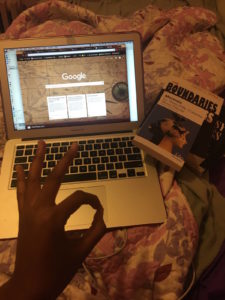
Recently I have been thinking a lot about the environments in which I work best, and I have made some important self discoveries that have allowed me to be more focused and productive in my work. A couple months ago I wrote a post about how my peers have shaped my Princeton experience. I’m someone who values social interaction, and I think dialogue and exchange of ideas are absolute necessities within an academic environment. Conversations with my friends can be a saving grace when I’m in an especially tough spot. However, this semester I’ve given myself a lot more time to be alone, and that has contributed positively to my Princeton experience.
I talk to myself—a lot. I spew out ideas and respond to questions I ask myself. Working alone allows me to have this inner dialogue out loud, which makes research processes like brainstorming a lot more productive for me. Also, a good test for whether or not I have a coherent research argument is whether or not I can explain, out loud, what my thesis is and the supporting evidence I have for it. I do this at several points in my writing, in the beginning when I’m trying to give myself a direction to answer the prompt, until the end when my ideas are fully explained. If I can’t articulate my essay content fluently (which happens almost every time!), I know to add more detail or tweak my arguments to better fit my research question. I also don’t have to have a skeptical audience to witness this process, which is a bonus.
Working alone gives me the freedom to let my mind wander, which is surprisingly helpful to my productivity. I’ve developed a new appreciation for distraction (outside of Facebook that is). Thinking freely allows me to reflect on important things that are happening in my life, other tasks that need tending to, or even a funny thing that happened that day that can pull me out of frustration while studying. By the time I circle back to my work, focusing on the assignment at hand isn’t as difficult because I’ve already addressed any sidetracking thoughts. Uninterrupted daydreaming is also a fun way to exercise my imagination. Though I don’t necessarily pull academic writing inspiration from the daydreams themselves, activating this part of my brain gets me in the mindset to be imaginative when it comes to research arguments (and not just what it would be like to be a wizard).
—Elise Freeman, Social Sciences Correspondent

